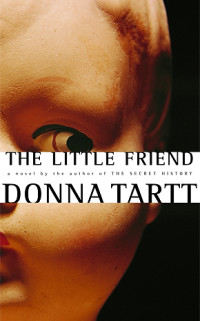How not to solve a murder
A review of ‘The Little Friend’ by Donna Tartt.
Mother’s Day. The 1960’s. Alexandra, Mississippi. Robin Cleve, nine years old, is found hanging in a three, dead. A cruel murder that nobody understands. Not his mother, nor his aunts, great-aunts or neighbours. And certainly not his baby sister from two months old.
Despite her age on the day of grief, it is Robins youngest sister, Harriet, that starts a long, difficult search to the murderer.
Even though the first pages, the back and the title of the book may make you think of it, this second Tartt-novel (after The secret History this novel came out in 2003) is not about the murder on the little boy. It is more about the Cleve-family dealing with what happened, about the whole way of living in the sixties in a strong religious area, about life in Mississippi. Tartt leads us through the fictional town of Alexandra by following main character Harriet, who has just turned twelve and is a bit of an oddity: extremely grown-up (a mother who has a depression; a father that lives in another town with another women even though nobody dares to say it out loud) and still such a little child (almost too many fantasies, playing all day long, not able to concentrate on anything mature).
Harriet tries to find out who the murderer of her older brother is, but while reading you almost forget what she is looking for. Maybe Harriet does so too when she gets lost in her own imagination, maybe Tartt did while writing. She started the book very good, you immediately want to continue to know what happened to pour little Robin. But then suddenly it is like the first chapter never happened, the murder is totally forgotten and it seems like Donna Tartt wrote an end and a beginning that do not belong together.
But, when we forget the idea of an exciting story about a liquidation of a child, when we forget the genre of the first part and move on to the second (which is more of a psychological novel instead of a thriller), this book makes everything good.
The boring, depressing life in Alexandra is described so well that you almost feel as miserable as the characters. You do not understand how life can be so aimless, and so it is easier to understand Harriet who is trying to give sense to her life. Tartt’s talent for describing things gives you the exact feeling as Harriet has, everything seems pointless and you can better stay in bed and sleep to pass the time (like Harriet’s sister Alice does). Maybe Donna Tartt’s capability to give so many details, to create an atmosphere so real you almost believe you have experienced it, comes from her own youth in Mississippi, where she was born in 1963, which might have been the exact same religious world as in The Little Friend.
So, if you can cope with a little sadness, and when you are able to put all your little negative thoughts away as soon as you close the book again, than I really recommend this book. Even though it might be more for Tartt’s amazing way of putting things on paper, than for the story itself.








REACTIES
1 seconde geleden